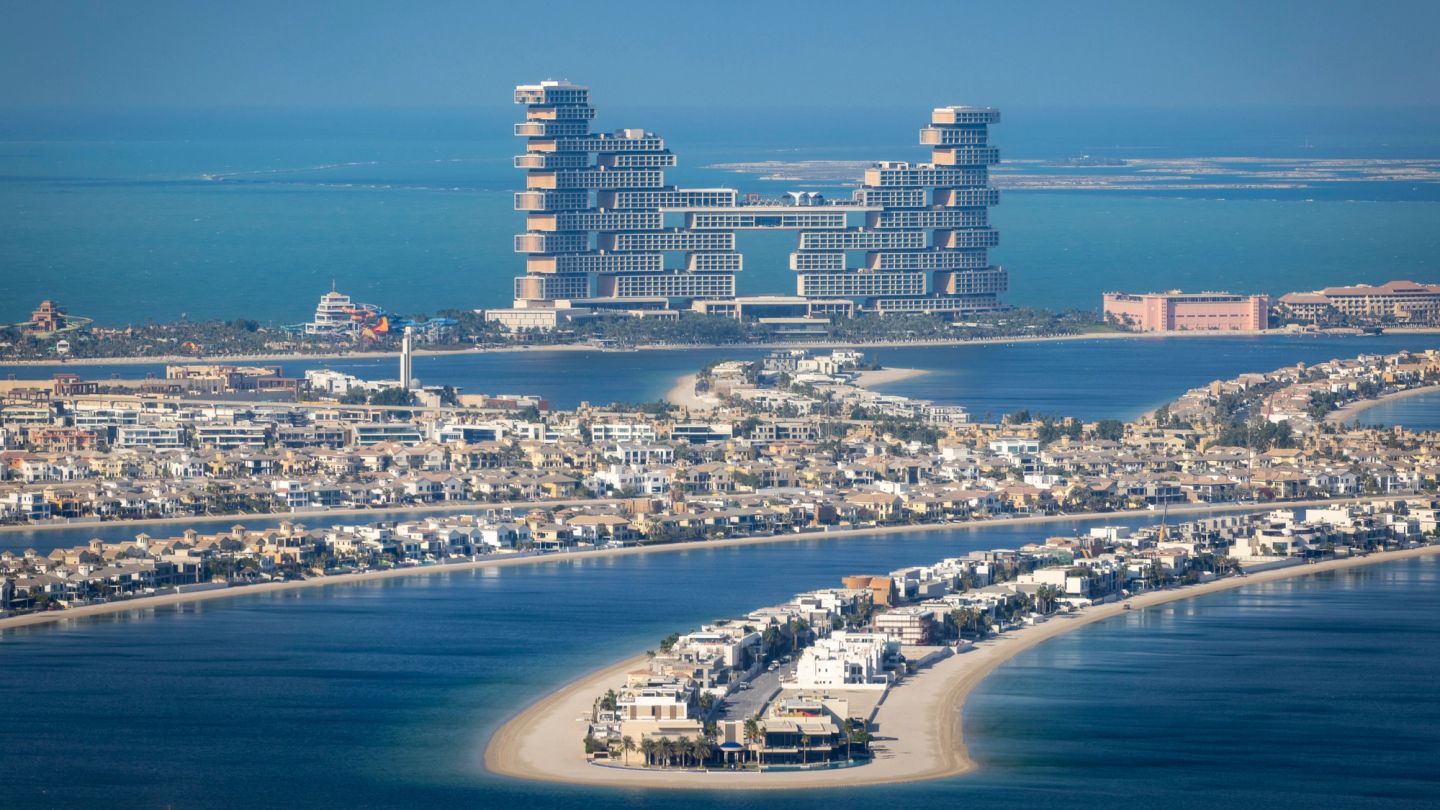

How to Move to Dubai From The UK: A Guide for British Expats
Moving to Dubai from the UK is as much about sensibility as it is about circumstance. The key lies in adapting with grace, curiosity and an instinct for the city’s quieter luxuries.
- Words: Rupert Taylor
There comes a moment in every British professional's life when the February rain becomes intolerable, the tax bill arrives looking like a small mortgage payment, and someone mentions that Dubai has 330 days of sunshine and zero income tax. Suddenly, relocating to the Arabian Gulf doesn't seem quite so dramatic.
Dubai has evolved from desert outpost to global financial hub in roughly the time it takes most British infrastructure projects to get planning permission. The city now hosts over 200,000 British expats who've traded drizzle for desert, queues at Sainsbury's for air-conditioned malls the size of small towns, and HMRC for the considerably more relaxed UAE tax authorities.
Moving to Dubai isn't simply booking a one-way flight and hoping for the best. It requires understanding visa options, navigating cultural differences, and accepting that you'll never again experience the simple pleasure of complaining about the weather. This guide explains precisely how to make the move without the usual expatriate disasters involving incorrect paperwork and confused immigration officials.
Moving To Dubai | Understanding Dubai’s Visa System
British passport holders receive a free 30-day visa on arrival for tourism, which is useful for reconnaissance missions but inadequate for actually living there. Establishing residency requires selecting the appropriate visa category from a surprisingly extensive menu of options.
The Employment Visa remains the most common route. Your employer sponsors the visa, handles the paperwork, and generally makes the entire process significantly less painful than trying to navigate UAE bureaucracy independently. The standard work visa ties you to your employer, which concentrates the mind wonderfully during salary negotiations. Green Visas, introduced more recently, offer five-year validity without employer sponsorship, though they require either substantial income (AED 360,000 annually from self-employment over the preceding two years) or proof of sufficient financial resources.
The Golden Visa represents Dubai's answer to attracting talent and wealth. Valid for ten years and renewable, it offers genuine long-term residency. Eligibility requirements include property investment exceeding £420,000, substantial capital investment, or demonstrable exceptional talent in fields like medicine, science, or arts. For those who qualify, it provides remarkable stability and the ability to sponsor family members without the usual complications.
The Remote Work Visa emerged during the pandemic and persists because Dubai understands the future of work better than most. It allows continuation of employment with your current UK company whilst residing in Dubai. Requirements include minimum monthly income of $3,500 USD, proof of employment with at least a year remaining on your contract, and health insurance covering the UAE. The visa lasts one year and cannot technically be renewed, though reapplication remains straightforward.
The Retirement Visa caters to those over 55 who've decided that spending their golden years somewhere consistently golden makes more sense than enduring British winters. Requirements include either owning Dubai property worth £420,000, having savings of £137,000, or demonstrating annual income of £109,000. Five-year validity provides genuine long-term planning options.
The Financial Mathematics That Makes People Move to Dubai
The absence of personal income tax represents Dubai's headline attraction, and it genuinely transforms financial planning. A £100,000 salary in London becomes approximately £61,000 after tax and national insurance. The same salary in Dubai remains £100,000. Over a decade, that difference compounds into rather substantial sums that can fund property purchases, investments, or simply a lifestyle that doesn't involve constant calculation of whether you can afford things.
However, Dubai isn't uniformly cheaper than the UK. Accommodation in desirable areas like Dubai Marina, Downtown, or Palm Jumeirah rivals or exceeds London pricing. A two-bedroom apartment in these locations easily costs £2,500 to £4,000 monthly. Dining, entertainment, and alcohol carry premium pricing; a decent bottle of wine costs £15 to £25 in licensed venues, while a proper British Sunday roast at a hotel brunch, such as at the St. Regis, can exceed £100 per person including drinks.
The calculation that makes Dubai attractive involves lifestyle and savings potential. With careful planning, professionals typically save 40 to 60 percent of their gross income, which simply isn't possible in the UK once tax, housing, and living costs are considered. The question becomes whether the lifestyle trade-offs justify the financial advantages.
Practical Relocation Steps in Dubai
Securing employment before relocating makes everything considerably easier. Your employer handles visa sponsorship, often provides accommodation allowances or relocation assistance, and generally smooths the transition. Job hunting from the UK is entirely feasible through recruitment agencies specialising in Middle East placements, LinkedIn networking, and the career pages of international firms with Dubai operations.
Once employment is confirmed, the visa process follows a predictable path. Your employer submits the application; you complete a mandatory medical fitness test, obtain an Emirates ID, the UAE’s biometric identity card required for everything from banking to utilities, and finally receive your residency visa stamp. The entire process typically takes four to eight weeks, during which you will live in temporary accommodation while formalities conclude.
Opening a bank account requires your Emirates ID, so this step cannot be completed before arrival. Most major UK banks, including Barclays, HSBC, and Lloyds, maintain operations in Dubai, offering welcome continuity. Emirates NBD, First Abu Dhabi Bank, and Mashreq are the principal local institutions. You will need your passport, Emirates ID, salary certificate, and proof of residence. Some banks impose minimum salary thresholds or opening balance requirements, so it is wise to research terms in advance.
Shipping personal belongings from the UK costs between £1,000 and £3,000, depending on volume and level of service. Professional moving companies manage customs clearance, which proves invaluable given the UAE’s import regulations. Many expatriates choose to ship only essentials and purchase furniture locally, where modern options are plentiful and delivery notably efficient.
Cultural Adaptation and Social Reality
Dubai operates under Islamic law, which influences daily life in ways both obvious and subtle. Alcohol is available but strictly regulated; consumption is permitted only in licensed hotels, restaurants, and clubs, and residents may obtain liquor licences for home use. Public intoxication is treated seriously and can lead to arrest.
Dress codes are far more relaxed than many expect, particularly in international districts. Swimwear is perfectly acceptable at beaches and pools, smart casual suffices for most restaurants and venues, and business attire follows Western standards. Modesty, however, is expected in government buildings, traditional areas such as Deira, and during Ramadan.
Ramadan, the Islamic holy month of fasting, transforms the rhythm of daily life. Eating, drinking, or smoking in public during daylight hours is prohibited. Many restaurants close until sunset, office hours shorten, and the general tempo of the city softens. For Western residents, it is a period of adaptation and respect, rewarded by the exuberant Eid celebrations that follow.
Dubai’s social landscape divides naturally into distinct circles. Hotels, beach clubs, and international restaurants create atmospheres indistinguishable from global capitals; Dubai Marina on a Friday evening could easily be mistaken for Canary Wharf with better weather. The British expatriate community is extensive and well organised, with rugby clubs, cricket leagues, and countless social groups. Inevitably, you will meet someone from your hometown.
Dating and relationships observe a different etiquette. Unmarried couples may now share hotel rooms and rent apartments together, thanks to recent legal reforms. Public displays of affection, however, should remain discreet, and propriety is still valued. Marriage, divorce, and custody matters are governed either by local law or by the law of one’s home country, depending on registration, an arrangement that can occasionally produce bureaucratic complexity.
What Nobody Tells You Before You Go
The heat is genuinely brutal. June through September, temperatures regularly exceed 40°C with humidity that makes stepping outside feel like entering a steam room. Air conditioning isn't a luxury; it's survival equipment. Many people barely venture outdoors during summer, moving between air-conditioned buildings, cars, and indoor activities. The winter months (November through March) are genuinely delightful, which is when Dubai becomes the city everyone imagines.
Driving in Dubai requires adjustment. The standard of driving ranges from excellent to terrifying, sometimes within the same roundabout. Speed cameras are ubiquitous, fines are substantial, and the points system can result in licence suspension. Many expats employ drivers rather than dealing with the stress, particularly given the excellent metro system and readily available taxis.
The transient nature of the expat community means friendships often have expiration dates. People arrive, stay two to five years, and return home or move elsewhere. Building lasting relationships requires acceptance of this constant turnover and investment in people knowing they might leave next year. The flipside is a remarkably welcoming social environment where newcomers are integrated quickly because everyone understands the challenges of starting over.
Healthcare is excellent but expensive without proper insurance. Most employment packages include comprehensive medical cover, which is fortunate because treatment costs rival or exceed private UK healthcare. The standard of care in major hospitals is genuinely world-class, combining Western-trained physicians with state-of-the-art facilities.
The Financial Setup Beyond the Basics
Maintaining UK financial connections whilst resident in Dubai requires planning. Most UK banks close accounts once you're no longer tax resident, though some offer international banking services. HSBC Expat and similar services cater specifically to British expats abroad, providing continuity whilst you establish local banking relationships.
Tax residency rules matter enormously. Becoming non-resident for UK tax purposes requires spending fewer than 16 days in the UK during a tax year (or fewer than 46 days over two years, with fewer than 91 days in either year). Exceeding these thresholds can trigger UK tax obligations on worldwide income, which rather defeats the purpose of moving. Professional tax advice before relocating saves considerable stress and potentially substantial money.
Pension planning becomes more complex as a non-resident. UK pensions can typically remain in place, though accessing them involves additional paperwork. Some people transfer pensions to Qualifying Recognised Overseas Pension Schemes (QROPS), though recent regulatory changes make this less attractive than previously. Again, professional advice proves invaluable.
Calculating Return on Investment in Dubai
Moving to Dubai makes financial sense for people earning £75,000 or more annually who plan to stay at least three years. Below that salary threshold, the savings potential doesn't justify the upheaval and distance from family. Above it, particularly for couples where both partners work, the financial advantages become genuinely transformative.
The lifestyle appeals to people who enjoy modern cities, international environments, and year-round outdoor activities without rain. If your ideal weekend involves quiet countryside walks, independent coffee shops, and Sunday roasts at country pubs, Dubai will feel rather sterile. If you prefer beach clubs, international dining, and never owning an umbrella, it works remarkably well.
Family considerations are crucial. Dubai offers excellent international schools, though fees range from £10,000-£25,000 annually per child. The city is genuinely safe, with crime rates far below UK levels. However, you're raising children far from grandparents, cousins, and the cultural context of home. Many families find this trade-off worthwhile; others return home after a few years when children reach secondary school age.
Making the Decision to Move to Dubai
Dubai works brilliantly as a three-to-seven-year strategic move for accumulating savings, advancing careers in international roles, and experiencing a genuinely different environment. It works less well as a permanent relocation for those deeply attached to British culture, seasons, and the particular pleasures of home.
The British expat community in Dubai reflects this reality. Turnover is high, yet a core group has remained for decades, suggesting it genuinely suits certain people while remaining a temporary chapter for others. Understanding which category you fall into before committing to the move saves considerable stress and expense.
The practical steps are simple: secure employment, process visa paperwork, relocate, establish local life, and begin building the tax-free savings that justify the entire exercise. The emotional and cultural adaptation requires far more flexibility and an acceptance that you are choosing a different life temporarily rather than permanently.
For those who make the move, Dubai offers remarkable professional opportunities, consistent sunshine, and the novelty of living somewhere where February does not involve fleeces and constant drizzle. Whether that compensates for distance from home, cultural adjustments, and residence in what is essentially a benevolent autocracy is a calculation each person must make for themselves.
What is certain is that the financial mathematics make sense for many professionals, the process is well established, and thousands of British expats navigate it successfully each year. The question is not whether it is possible; it plainly is, but whether it suits your particular circumstances, priorities, and tolerance for heat.


